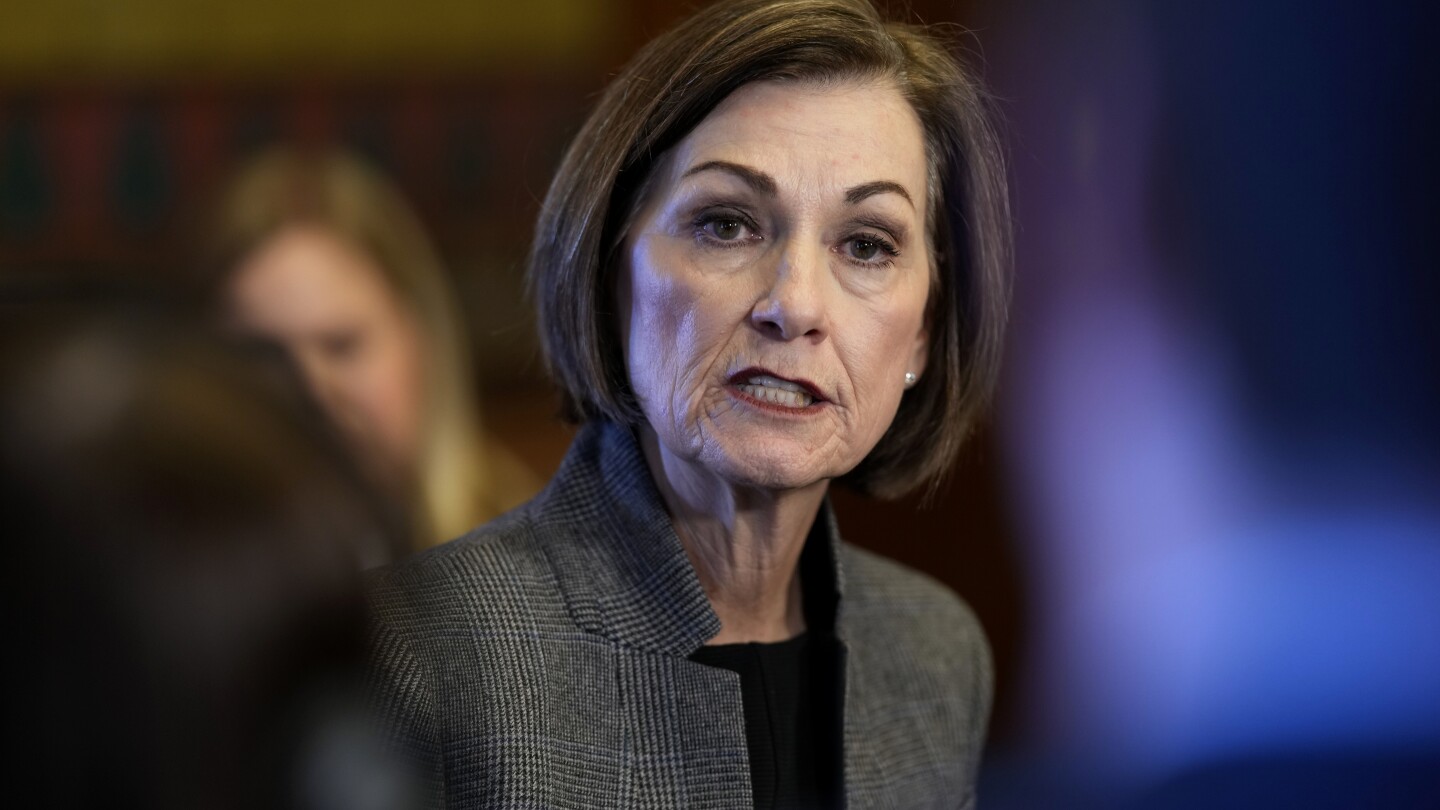DES MOINES, Iowa (AP) — Iowa has been the only state in the U.S. to explicitly mandate that state, county and local decision-making bodies are balanced by gender. That will end when Iowa Gov. Kim Reynolds signs a bill that aligns with a broader abrogation of gender- and race-conscious policies across the country.
Civil rights advocates worry the trend will lead to fewer opportunities and more hurdles for diverse voices in U.S. institutions. In Iowa, advocates for the gender balance requirement are concerned appointive governing bodies, which have not entirely reached parity even with the mandate, will become less representative.
Republicans said it was past time to remove the discriminatory mandate that prioritizes a person’s gender over their merit. That view was reinforced by a federal judge’s ruling that there’s not sufficient evidence the law is compensating for discrimination now like it was when it was first introduced in 1987.
Across the U.S., Republican-led Legislatures are looking to counteract protections for historically marginalized groups, which conservative lawmakers consider discriminatory. That’s led to women’s “bills of rights” that define sex as binary; the exclusion of transgender girls and women from female sports; and the dissolution of diversity, equity and inclusion programs on college campuses.
“If ever there was a time that this was a good idea, it is no longer now,” Iowa Republican Sen. Jason Schultz said of the mandate when he introduced the bill for a vote. “The world has changed, and it is time that men and women are selected on their qualifications and nothing else.”
The Iowa bill passed in the Senate and House and is awaiting Gov. Reynolds’ signature. Iowa’s current law requires a three-month waiting period before board, commission and committee applicants of any gender can be considered. The repeal would mean that officials do not have to first try to find a qualified applicant that would bring gender parity to bodies like the human rights commission or the licensing board for doctors.
In supporting the bill, Iowa Republican Sen. Chris Cournoyer said the suggestion that the number of women serving would decrease without the requirement was sad. Instead, she said, the requirement stifles the number of qualified women who serve.
“Women who have worked hard to earn their success should not have that success diminished by those that depend on a system that allows them to fall upward,” Cournoyer said.
That’s a false dichotomy, said Karen Kedrowski, political scientist and director of Iowa State University’s Carrie Chapman Catt Center for Women and Politics. Ensuring representative bodies does not amount to appointing underqualified individuals just because they fit the requirement, she said.
The law did not specify oversight for the mandate, so the Carrie Chapman Catt Center started tracking members on certain boards and commissions in every county and many cities.
As of 2022, there were more gender-balanced bodies than there were a decade earlier, meaning women are better distributed across them, Kedrowski said. There’s a higher percentage of appointed positions and of chair positions belonging to women.
Iowa Democrats speaking against the bill referenced that data to credit the mandate for women’s inroads.
“Simply because progress has been made does not mean it’s not going to roll back,” Sen. Janice Weiner said to her colleagues, adding that public servants from different backgrounds each bring important perspectives that inform decisions.
Iowa was the first state to initiate a requirement for statewide boards and commissions when the law passed over three decades ago; then, the Legislature extended the requirement to all levels of government to go into effect in 2012.
More than a dozen states have laws encouraging authorities to appoint members of statewide boards and commissions that reflect the population they serve by gender.
Those statutes are increasingly being targeted in court. The Supreme Court’s decisions last year to revoke affirmative action in college admissions have reinvigorated legal challenges to diversity policies of all kinds.
Pacific Legal Foundation, a national law firm that focuses on government overreach, represented an Iowan in the case about the judicial nominating commission, which recommends to the governor candidates for the state’s high courts. The federal judge ruled the gender balance requirement for that body is unconstitutional.
These kinds of board and commission policies are “pretty prolific across the country,” said senior attorney Joshua Thompson. Their research on 20 professional licensing boards identifies about two dozen states with race- or sex-conscious statutes.
Whether race or sex, Thompson said they are focused on instances where “it’s government treating people differently with respect to immutable characteristics” without evidence the treatment remedies discrimination.
The firm also represented an Arkansan, who alleged a race-based quota for the board licensing social workers violated his rights. There are ongoing cases in Tennessee, Alabama and Louisiana, with more expected, Thompson said.
Rachel Smith, senior counsel at the National Women’s Law Center, said these challenges have “picked up steam” following the Supreme Court’s decisions last year even though those were limited in scope.
Smith emphasized that the judge’s opinion in Iowa “does nicely underscore that gender-conscious laws can be constitutional,” given the recognition that it was necessary when enacted.
“While we’re seeing this rush across the country to throw the baby out with the bathwater, to get rid of all laws and programs that try to counter discrimination and increase diversity,” Smith said. “It’s important to remember that where there is discrimination — and we know that discrimination is still pervasive — that measures to ensure equal opportunities for women are still needed.”

